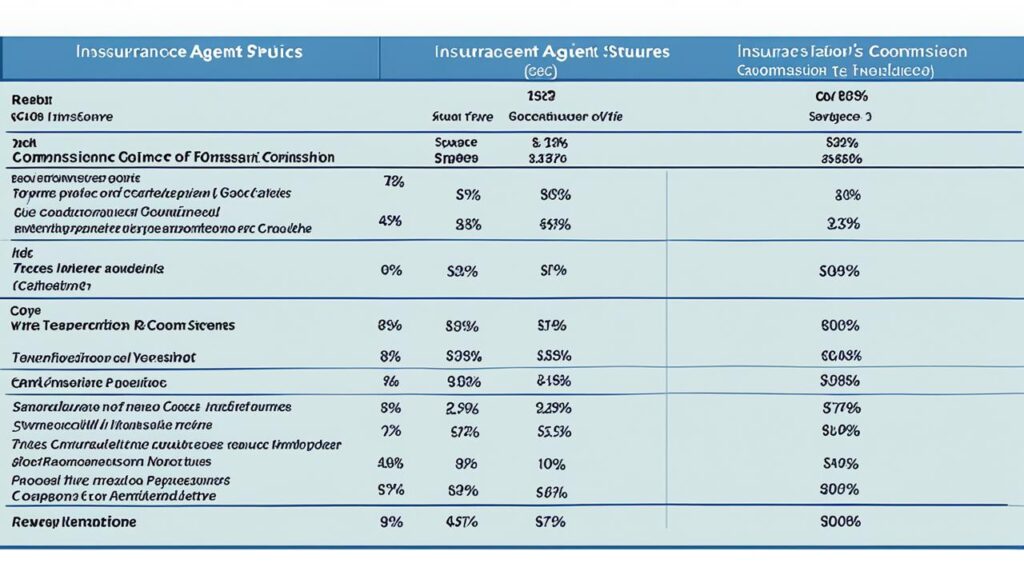Insurance agents are key in helping clients navigate the complex world of insurance. They act as a bridge between insurance companies and consumers. With deep knowledge of insurance products and access to many carriers, they find the best coverage for you.
Looking for auto, homeowners, life, or other insurance? An experienced agent will look at your unique needs and risks. They’ll then suggest personalized solutions to make sure you’re well-protected.
For those with high-risk driving records or pre-existing health issues, finding affordable insurance can be tough. But insurance agents know how to find options that might not be available directly to consumers. They understand your situation and goals. So, they can compare policies, rates, and coverage levels to give you the best options within your budget.
Key Takeaways
- Insurance agents serve as intermediaries between clients and insurance companies.
- They leverage their product knowledge and industry expertise to identify the most suitable coverage options.
- Agents can help clients find affordable insurance policies, even for high-risk individuals or those with pre-existing conditions.
- By assessing a client’s unique needs and goals, agents can provide personalized recommendations to ensure proper protection.
- Clients can benefit from an agent’s access to multiple insurance carriers, allowing for comparative analysis and customized solutions.
Understanding Independent Insurance Agents
Independent insurance agents are licensed pros who work with many insurance companies, not just one. They can look at different options to find the best coverage for their clients.
What Are Independent Insurance Agents?
These agents can sell policies from various insurance companies. They make money when they help clients get policies. This lets them offer more choices than captive agents, who can only sell from one company.
How Independent Agents Differ from Captive Agents
- Independent agents work with many insurance companies, while captive agents work for just one insurance company.
- They can look at multiple carriers and contracts to find the best for their clients. Captive agents are stuck with what their company offers.
- They get paid from the policies they sell. Captive agents get a salary and might get extra money from their company.
| Independent Agents | Captive Agents |
|---|---|
| Represent multiple insurance companies | Employed by a single insurance company |
| Can compare and offer a wider range of products | Limited to the products and services of their employer |
| Earn commissions based on policies sold | Receive a salary with potential bonuses/incentives |
Knowing the differences between independent and captive agents helps consumers choose the right insurance pro for their needs.
When to Work with an Independent Insurance Agent
Independent insurance agents are great when you need special coverage. They know many insurance companies. This lets them find policies that fit your specific needs.
Auto Insurance for High-Risk Drivers
If you’re a high-risk driver, like after many accidents or a DUI, an independent agent can help. They find coverage from smaller insurers that take on these risks. They make sure you get the coverage you need at a good price.
Homeowners Insurance in High-Risk Areas
Living in a place prone to disasters can make finding homeowners insurance hard. An independent agent can connect you with insurers that offer policies for your area. They ensure you get the right protection at a fair price.
Life Insurance for Individuals with Pre-Existing Conditions
Finding affordable life insurance with pre-existing conditions is tough. Independent agents have access to many insurers, including those for people with health issues. They help you find a plan that suits your budget and health.
Working with an independent insurance agent means you get many specialized policies. This is true whether you’re a high-risk driver, live in a dangerous area, or have health issues. They offer tailored solutions for your needs.
What Independent Insurance Agents Cannot Do
Independent insurance agents are great at helping clients find the right coverage. But, they have some limits to their role. They can’t provide retroactive coverage for events that have already happened. This means if you’ve had a claim or incident before meeting an agent, they can’t insure it later.
Also, waiting until after your policy is canceled to get an agent’s help might lead to higher rates. Insurers see customers with lapsed coverage as more risky. So, you might pay higher premiums when trying to get new coverage.
- Agents cannot provide retroactive coverage for past events
- Seeking an agent after policy cancellation can lead to higher insurance rates
- Customers with lapsed coverage are often seen as higher risks by insurers
“It’s important to be proactive and work with an independent agent before any coverage lapses or claims occur. They can help you find the best policy for your needs and prevent costly surprises down the line.”
Knowing these limits helps consumers make better choices. They can work with their independent insurance agents to have the right coverage. This way, they can avoid gaps or unexpected costs.
Insurance Agents Commissions and Payment Structure

Independent insurance agents make most of their money from commissions on the policies they sell. The way they get paid can change based on the insurance type and the company they work with.
For life insurance, these agents usually get a commission of 60% to 80% of the first-year premiums. So, if a client pays $1,000 in premiums, the agent could make $600 to $800 in the first year. But, the commission on renewals is much lower, usually 2% to 5%.
| Insurance Type | First-Year Commission | Renewal Commission |
|---|---|---|
| Life Insurance | 60% – 80% | 2% – 5% |
| Auto Insurance | 5% – 15% | 2% – 5% |
| Homeowners Insurance | 5% – 15% | 2% – 5% |
Auto and homeowners insurance have lower commissions, usually 5% to 15% for the first year. Renewal commissions are 2% to 5%.
It’s key to remember that commissions can change with different insurance companies and products. So, insurance agents need to know the payment details for each company they work with.
Pros and Cons of Working with Independent Agents

Working with an independent insurance agent has its perks. They can look at many insurance providers to find the best deals for you. This is great for people with high-risk profiles or special insurance needs. Independent agents often know about policies that aren’t available directly to consumers.
Advantages of Using Independent Agents
- Ability to compare quotes from multiple carriers to find the best coverage options
- Access to specialized policies for high-risk individuals or unique insurance needs
- Personalized guidance and support throughout the insurance buying process
- Potential for cost savings by leveraging an agent’s industry knowledge and relationships
Potential Drawbacks of Independent Agents
- Commission-based compensation structure, which may lead to upselling or biased recommendations
- Varying levels of expertise and product knowledge among individual agents
- Potential for less standardized customer service and communication compared to direct-to-consumer channels
Independent insurance agents bring many benefits, but it’s key to pick the right one for you. Knowing the good and bad about independent agents helps you make a smart choice. This way, you can get the insurance coverage that suits you best.
| Advantages of Independent Agents | Potential Drawbacks of Independent Agents |
|---|---|
|
|
“Working with an independent agent can open up a world of insurance options, but it’s important to choose someone you trust to provide unbiased recommendations.”
Insurance Agents vs. Insurance Brokers

Insurance agents and insurance brokers both help clients with insurance. But, they have different roles. Insurance agents work for insurance companies. They sell policies and handle the process of making them official. Insurance brokers, however, work for the client. They look for the best coverage and prices from various insurance companies.
Insurance brokers can’t sell policies themselves. They need a licensed insurance agent to complete the underwriting process. Insurance brokers connect clients with the right insurance agents. They negotiate to get the best deals for their clients.
| Insurance Agents | Insurance Brokers |
|---|---|
| Represent the interests of insurance companies | Act on behalf of the client to find the best coverage and pricing |
| Can directly sell and “bind” insurance policies | Cannot directly sell or “bind” insurance policies |
| Focus on policy underwriting and issuance | Serve as intermediaries, connecting clients with appropriate agents |
In summary, insurance agents and insurance brokers both have key roles in insurance. But, their main duties and loyalties are different. Clients should think about their needs and what they prefer when choosing between an insurance agent or a insurance broker.
Simplifying the Customer Experience
In today’s competitive insurance world, making the customer experience smooth and personal is key. Agents and agencies need to use new digital tools that meet the changing needs of today’s buyers.
Creating a User-Friendly Website
A good, easy-to-use website is the base of a great customer experience. Insurance agents should work on making their websites simple and mobile-friendly. This way, clients can easily find what they need, get quotes, and file claims. By putting the customer first, agents make sure their online presence is helpful and interesting.
Implementing Conversational Communication Platforms
Agents should also look into using chatbots or text messaging for better customer service. These tools give clients quick, personal help, answering their questions smoothly. By talking more like people, agents can make the customer experience better and grow stronger ties with their customers.
| Key Elements for Simplifying the Customer Experience | Benefits |
|---|---|
| User-Friendly Website | Improved accessibility, increased client engagement, and enhanced brand image. |
| Conversational Communication Platforms | Personalized support, improved response times, and stronger client relationships. |
“By prioritizing the customer experience, insurance agents can differentiate themselves from the competition and build lasting relationships with their clients.”
Building Trust and Connecting with Clients

Building client trust is key for any insurance agency’s success. Agents can earn this trust by showing they know their products well. They also need to keep in touch with customers through various ways.
Demonstrating Expertise and Product Knowledge
Clients trust agents who know a lot about insurance and keep up with changes. By showing their knowledge, agents help clients find the right insurance. This makes clients feel secure and understood.
Proactive Communication and Touchpoints
Keeping in touch with clients is crucial for a strong bond. Agents can do this through newsletters, social media, and personal messages. This keeps clients updated and builds trust.
“We’ve been with our insurance agent for years because they always keep us informed and make sure we have the right coverage. They truly understand our needs and go the extra mile to ensure we’re taken care of.”
Agents who show they know their products, communicate well, and connect with clients build trust and loyalty. These are key for an agency’s success over time.
Keeping Promises and Showing Credentials
As an insurance agent, building trust with your clients is key. You must always keep your promises and show you’re credible with testimonials and reviews. Doing this builds your agency’s trust, credibility, and integrity. This leads to strong, lasting relationships with your clients.
Delivering on Your Commitments
Keeping promises is the base of trust with clients. This means answering quickly, giving correct info, and solving problems fast. Being reliable and committed makes your agency stand out for its integrity.
Leveraging Client Testimonials and Reviews
Good testimonials and reviews boost your agency’s image and trust. Ask clients to share their stories and put these on your site and ads. This makes new clients trust you to meet their needs.
| Keeping Promises | Client Testimonials |
|---|---|
|
|
Always keep your promises and use client feedback to show your agency’s credibility, integrity, and customer-centric focus. This way, you keep promises and build lasting relationships with your clients.
“The team at ABC Insurance Agency has always been responsive, knowledgeable, and committed to finding the right coverage for my needs. I highly recommend them to anyone looking for a trustworthy insurance partner.”
Also Read : Life Insurance for Young Adults: Financial Security, Affordable Premiums, Policy Choices
Providing Customized Insurance Solutions

Successful insurance agents know that a one-size-fits-all approach doesn’t work for everyone. They offer customized insurance solutions to meet the unique needs of each client. This might mean flexible policy options, special coverage for high-risk situations, or tailored packages for specific insurance needs.
At the core of this approach is really understanding what the client needs. Agents take the time to listen and analyze the client’s risks, goals, and budget. This helps them create personalized coverage that protects and adds value for the client.
- Flexible policy options to accommodate changing needs
- Specialized coverage for high-risk scenarios
- Tailored insurance packages that address unique requirements
By offering customized insurance solutions, agents build trust with their clients. This ensures their unique needs are met. It also makes clients more loyal and satisfied, leading to more business.
“The most valuable asset an insurance agent can have is a deep understanding of their clients’ needs and the ability to craft solutions that truly address them.” – Jane Doe, Insurance Consultant
Being able to offer customized insurance solutions sets successful agents apart. It helps them stand out, build strong relationships, and deliver great value to their clients.
Insurance Agents
Insurance agents are key in the complex world of insurance. They help clients find the right coverage for their needs. Whether they work alone or for a company, they use their deep knowledge and personal touch to guide and support people.
These agents act as trusted advisors. They work closely with clients to understand their unique situations and insurance needs. With their deep knowledge of insurance products, they can suggest solutions that fit just right.
Building strong relationships with clients is important for agents. They are often the first ones clients talk to. They make sure clients feel heard and informed, keeping them updated on their insurance.
Agents also make insurance easier to understand. They explain complex terms in simple ways, helping clients make smart choices. With their skills in talking and knowing about insurance, they help clients get the most out of their policies.
At the end, insurance agents offer personalized solutions that really meet their clients’ needs. They use their knowledge, focus on clients, and promise-keeping to make a big difference in the insurance world and for their clients.
“Insurance agents are the bridge between complex policies and the everyday needs of their clients. Their expertise and dedication are invaluable in ensuring individuals and businesses have the right coverage to protect what matters most.”
Conclusion
Insurance agents are key in helping clients navigate the complex insurance world. They help clients choose between independent and captive agents. This choice depends on what the client needs.
Independent agents offer a wide range of insurance products. They can customize solutions for clients with special needs. This makes their service more personal.
Good insurance agents show they know the industry well. They build trust by being open and communicate well. They offer solutions that fit each client’s situation.
They focus on the client’s needs and use their knowledge to make things simpler. This helps clients make smart choices to protect their money.
Agents are crucial in handling tough situations, like finding life insurance for those with health issues. They help secure the right homeowners insurance too. A skilled agent is a big help in protecting what’s important.
As insurance changes, agents must keep up and innovate. Their ability to do this and offer great service will set them apart. They will meet the changing needs of their clients.
FAQs
Q: How do insurance agents help clients choose the right policy?
A: Insurance agents help clients choose the right policy by assessing their needs, providing guidance on available coverage options, explaining the terms and conditions of different policies, and ultimately recommending the most suitable insurance plan based on the client’s specific requirements.
Q: What is the role of an insurance agent?
A: An insurance agent acts as an intermediary between insurance companies and clients, helping clients navigate the complex world of insurance by providing advice, facilitating policy purchases, and offering ongoing support for any insurance-related queries or claims.
Q: How do insurance agents find the right insurance coverage for clients?
A: Insurance agents find the right insurance coverage for clients by understanding their individual needs, analyzing various insurance products available in the market, comparing coverage options from different insurers, and tailoring a policy that best fits the client’s requirements and budget.
Q: What is the difference between an insurance agent and an insurance broker?
A: While both insurance agents and insurance brokers act as intermediaries between clients and insurance companies, the key difference lies in their legal relationship with the insurers. Insurance agents typically represent one insurance company, while insurance brokers work independently and can offer policies from multiple insurers.
Q: Do insurance agents need to be licensed?
A: Yes, insurance agents must be licensed by the state in which they operate to legally sell insurance products. Licensing requirements ensure that agents have the necessary knowledge and expertise to provide accurate information and advice to clients regarding insurance policies.
Q: How do insurance agents get paid?
A: Insurance agents typically earn a commission from the insurance company for each policy they sell. The commission amount can vary depending on the type of insurance product, the insurer, and the specific terms of the agent’s agreement with the company.
Q: Where can I find an insurance agent near me?
A: You can find an insurance agent near you by contacting local insurance agencies, searching online directories of licensed agents, or reaching out to national associations of insurance agents that can provide recommendations for reputable agents in your area.
Source Links
- https://www.providentins.com/5-methods-for-insurance-agents-to-improve-customer-service/
- https://blog.agentero.com/post/top-4-ways-insurance-agents-can-build-client-trust
- https://www.nerdwallet.com/article/insurance/independent-insurance-agents




